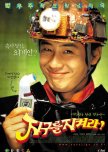Crazy Delight
Rewatching this gem after so many years, I am quite surprised how little recogniton this film has even among Korean film enthusiasts. There are fans who know all the main directors and love to watch arthouse directors, such as Hong Sang Soo, but whenever I ask them have you seen "Save the Green Planet?" I'm often met with a perplexed look: "What's that?"
Save the Green Planet!, Jang Joon Hwan's feature-length debut film, is a sci-fi, comedy, psychological thriller. Yes, somehow Jang Joon Hwan also manages to masterfully weave the disparate genres all on his debut! The film is told from the perspective of Byeong Gu, a secluded beekeeper living in an isolated house on top of a mountain. This house, however, is no ordinary house; it was rebuilt over an abandoned mannequin factory allowing for a labyrinthian underground palace with various elaborate makeshift devices and traps. Byeong Gu is also no ordinary man. He is a delusional conspiracy theorist who is convinced that the CEO of a pharmaceuticals company is in fact an alien overlord. Sheer madness and hilarity ensues when Byeong Gu kidnaps and traps the CEO under his house. Byeong Gu attempts to torture the truth out of the CEO, while he goes on with his ordinary day-to-day activities, while avoiding the attention of authorities, and all while treading the thin line of sanity and insanity, if he hasn't already fallen over that is.
What I most appreciated about the film is how Jang Joon Hwan subverts the traditional hero's journey and what we have instead is a very confused and pitiful villain against an asshole victim. Our morals are constantly tested, the legal procedure is flipped, and just as we are complicit in Byeong Gu's devious acts, we also end up a little bit insane with him. The film ossicilates between the different genres quite naturally. It has moments of absurdity with surrealistic elements, but Jang Joon Hwan doesn't use the surreal as a cheap tool to lose the logical coherence of the film as most surrealist comedies do. Rather, it is a tool used to create or alleviate tension and self doubt. For maximal enjoyment of the film, I recommend not to view the film as morally prescriptive, but rather examine how Jang Joon Hwan plays around with various tropes and conventions.
Unfortunately, after Save the Green Planet's box-office flop, Jang Joon Hwan must await nearly a decade for another attempt at feature-length film. But by then, the damage is done; the creativity and ambitions of Save the Green Planet! is long gone and what's left is caged bird: the conventions that Jang Joon Hwan attempted to overcome becomes his shackles.
Save the Green Planet!, Jang Joon Hwan's feature-length debut film, is a sci-fi, comedy, psychological thriller. Yes, somehow Jang Joon Hwan also manages to masterfully weave the disparate genres all on his debut! The film is told from the perspective of Byeong Gu, a secluded beekeeper living in an isolated house on top of a mountain. This house, however, is no ordinary house; it was rebuilt over an abandoned mannequin factory allowing for a labyrinthian underground palace with various elaborate makeshift devices and traps. Byeong Gu is also no ordinary man. He is a delusional conspiracy theorist who is convinced that the CEO of a pharmaceuticals company is in fact an alien overlord. Sheer madness and hilarity ensues when Byeong Gu kidnaps and traps the CEO under his house. Byeong Gu attempts to torture the truth out of the CEO, while he goes on with his ordinary day-to-day activities, while avoiding the attention of authorities, and all while treading the thin line of sanity and insanity, if he hasn't already fallen over that is.
What I most appreciated about the film is how Jang Joon Hwan subverts the traditional hero's journey and what we have instead is a very confused and pitiful villain against an asshole victim. Our morals are constantly tested, the legal procedure is flipped, and just as we are complicit in Byeong Gu's devious acts, we also end up a little bit insane with him. The film ossicilates between the different genres quite naturally. It has moments of absurdity with surrealistic elements, but Jang Joon Hwan doesn't use the surreal as a cheap tool to lose the logical coherence of the film as most surrealist comedies do. Rather, it is a tool used to create or alleviate tension and self doubt. For maximal enjoyment of the film, I recommend not to view the film as morally prescriptive, but rather examine how Jang Joon Hwan plays around with various tropes and conventions.
Unfortunately, after Save the Green Planet's box-office flop, Jang Joon Hwan must await nearly a decade for another attempt at feature-length film. But by then, the damage is done; the creativity and ambitions of Save the Green Planet! is long gone and what's left is caged bird: the conventions that Jang Joon Hwan attempted to overcome becomes his shackles.
Vond je deze recentie nuttig?

 1
1




